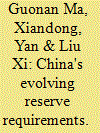| Srl | Item |
| 1 |
ID:
120840


|
|
|
|
|
| Publication |
2013.
|
| Summary/Abstract |
We examine the role of reserve requirements as a cheaper substitute for the open market operations of the People's Bank of China (PBC) to sterilise foreign exchange interventions in recent years. China's reserve requirements have also been used to address a range of other policy objectives, not least macroeconomic management, financial stability and credit policy. The preference for reserve requirements reflects the size of sterilisation and the associated costs, in a quantity-oriented monetary policy framework faced with policy dilemmas. The PBC often finds it easier to make reserve requirement adjustments than interest rate decisions and enjoys greater discretion in applying this tool. The monetary effects of reserve requirements need to be explored not in isolation but in conjunction with other policy actions. Depending on the policy mix, higher reserve requirements tend to signal a tightening bias, to squeeze excess reserves of banks, to push market interest rates higher and to help widen net interest spreads, thus tightening domestic monetary conditions. Reserve requirements, however, impose an implicit tax burden on Chinese banks, albeit the latter seem to pass through a large but incomplete portion of these costs to their customers.
|
|
|
|
|
|
|
|
|
|
|
|
|
|
|
|
| 2 |
ID:
113714


|
|
|
|
|
| Publication |
2012.
|
| Summary/Abstract |
This paper examines Kang Youwei's perception of India as well as his impact on the Chinese discourse on India during the late Qing and Republican periods. The analysis is pursued on the basis of a letter entitled 'A letter to Liang Qichao and other students on [the fact that] the Fall of India [as an independent country] was due to the Independence of Its Provinces'. Kang wrote this letter to Liang, his closest student and associate who was also a famous intellectual, when Kang was in Darjeeling in May 1902. Kang was keen to diagnose India's collapse to British colonialism for the purpose of helping China avoid a similar fate. This essay argues that his journey to and writings about India were of great significance in shaping the modern Chinese perceptions of India. He, for the first time, explicitly made a comprehensive comparison between China and India and positioned India as a negative example for the Chinese. From then on, India's image among many Chinese intellectuals was that of a failed nation unable to confront imperialism.
|
|
|
|
|
|
|
|
|
|
|
|
|
|
|
|